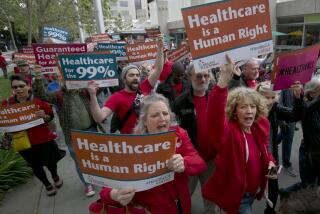Democratic Medical Plan Clears Senate Committee : Insurance: The action is the opening volley on a key election-year issue. The Bush Administration warns of a veto.
- Share via
WASHINGTON — Senate Democrats fired their first major salvo Wednesday in the election-year battle over the health care issue, as the Senate Labor and Human Resources Committee gave its initial approval to sweeping “play-or-pay” legislation designed to extend medical coverage to all Americans.
The bill, one of three major health care proposals the Democrats are considering this year, would require employers either to provide insurance for all their workers or to pay higher payroll taxes to help with the cost of alternative federal coverage.
The plan, approved on a party-line vote in the face of a veto threat from the Bush Administration, is designed to serve as a Democratic rallying point in the competition to enact health care legislation this year, perhaps before the election.
Medical care has become a major issue of the presidential and congressional campaigns as insurance costs have soared and layoffs have mounted, leaving workers without coverage. Some 35 million Americans have no medical insurance.
It was not yet clear, however, whether Wednesday’s measure ultimately would be passed by the full Senate. The “play-or-pay” legislation is vigorously opposed by small business and may well be sidetracked by the Senate Finance Committee, which is working on a rival plan.
President Bush is to unveil his own health-care plan in his State of the Union address Tuesday, although the White House proposal is expected to be far less comprehensive.
Secretary of Labor Lynn Martin has said the plan, advanced by Sen. Edward M. Kennedy (D-Mass.), would worsen unemployment because it would saddle small businesses with excessive costs. On Wednesday she sent the panel a letter warning she would urge Bush to veto the measure if it is passed.
Kennedy, the labor panel’s chairman, called the bill a “benchmark” by which the Administration’s proposals could be judged. Senate Majority Leader George J. Mitchell (D-Me.), a co-sponsor of the committee’s proposal, hailed the panel’s action and reiterated his intention to make health care legislation a primary objective this year.
Conspicuously, however, Mitchell did not commit himself to pushing through the Kennedy program. He pledged only to work with Kennedy and Finance Committee Chairman Lloyd Bentsen (D-Tex.) “to decide how best to proceed to accomplish this goal.”
The bill that cleared the Labor and Human Resources panel Wednesday has four major elements:
--It would require employers to provide minimum health benefits to all workers or pay a special payroll tax that would be used to finance alternative medical insurance provided by the federal and state governments to those not otherwise covered.
--It would offer special incentives to promote “managed care,” under which medical services are provided by a health maintenance organization or similar group instead of by a physician practicing on his own. Companies would negotiate charges with HMO officials.
--It would start an independent Federal Health Expenditure Board to develop standards for physicians’ fees and hospital charges, and to make sure they are followed--either voluntarily or by federal mandate.
--For those whose employers do not pay for their medical insurance, the bill would establish a federally run AmeriCare plan to provide comparable coverage. The plan would go beyond and replace Medicaid, which now is limited to the poor.
The panel estimated the initial cost of the program at about $6 billion a year, but the cost would mushroom as the plan went into full effect. Aides said the cost would be borne in part by increased payroll taxes and in part from savings expected to result from absorbing Medicaid.
The basic benefits the measure would prescribe would include hospital and physician services, diagnostic tests, limited psychiatric benefits, prenatal and well-baby care and coverage of check-up services such as mammograms.
UNINSURED RANKS GROW: The number of Americans without health insurance is put at 35.7 million. D1
More to Read
Get the L.A. Times Politics newsletter
Deeply reported insights into legislation, politics and policy from Sacramento, Washington and beyond. In your inbox twice per week.
You may occasionally receive promotional content from the Los Angeles Times.










